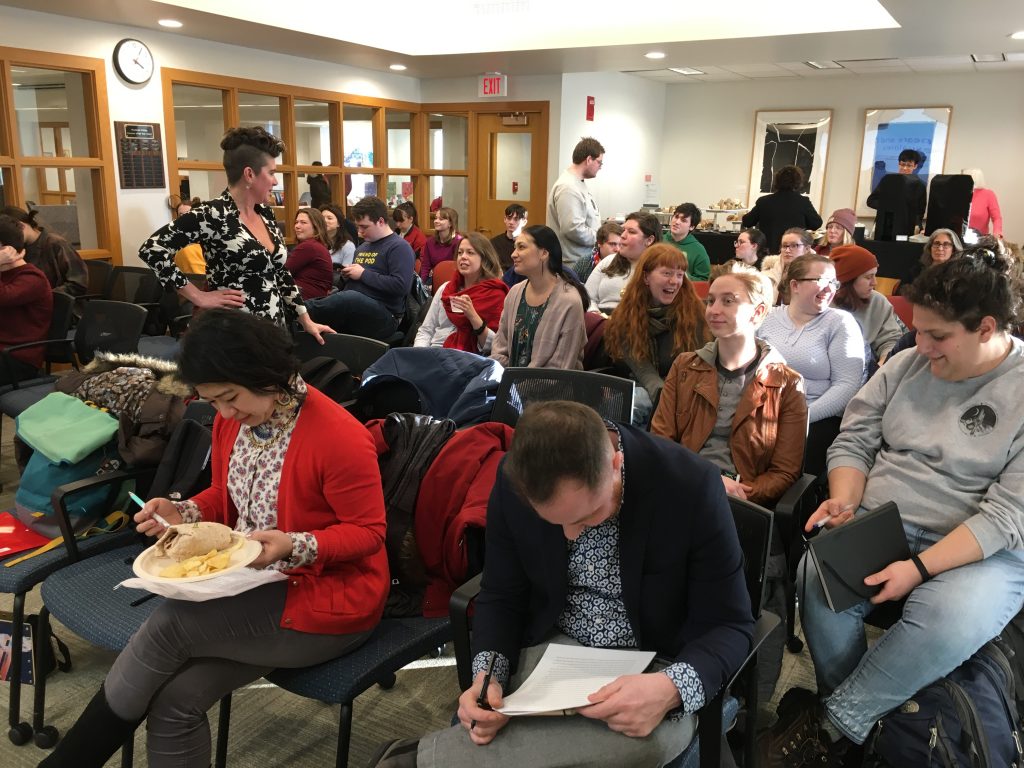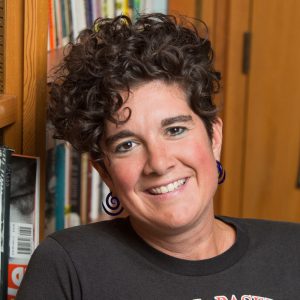Uncommon Bodies Brings Innovative Scholarship to Campus
Contact
The Words: Macalester's English Student NewsletterSenior Newsletter Editors:
Birdie Keller '25
Daniel Graham '26
Callisto Martinez '26
Jizelle Villegas '26
Associate Newsletter Editors:
Ahlaam Abdulwali '25
Beja Puškášová '26
Sarah Tachau '27
Peyton Williamson '27

Laura Berglund ’20
February marked the new year’s first session of Uncommon Bodies: Research in Early Modern Literature and Culture. This series of research workshops, led by Macalester English Professor Penelope Geng and University of Minnesota French and Italian Professor Jennifer Row, explores conceptualizations of the human body via historical texts and contemporary lenses.
Last fall, the group discussed sixteenth and seventeenth century visual art, fairy tales, and literature. Professor Row unpacked gendered and ableist metrics of beauty and intelligence in the French folktale “Riquet with the Tuft,” and Professor Geng put contemporary scholarship in conversation with Shakespeare’s Twelfth Night to reflect on early modern practices of shame and shaming. In later gatherings, Carleton College French Literature, Language and Culture Professor Cathy Yandell presented on deformity in French philosopher Michel de Montagine’s essay “Of Cripples.” Finally, UMN graduate students wrapped up 2019 with a discussion about etchings by French artist Jacques Callot.
Professor Geng and Professor Row have hosted sessions at Macalester, the U of M, and the Minneapolis Institute of Art, and last month Uncommon Bodies returned to Macalester for a workshop titled “Early Modern Trans x Disabilities.” Here, participants explored disability and trans identities with Willamette University English and Women’s and Gender Studies Professor Professor Allison Hobgood and Bryn Mawr College English Professor Colby Gordon.

Professor Hobgood began the event with a discussion of Shakespeare’s Measure for Measure. She focused on the comedy’s presentation of a fictionalized Vienna that criminalizes and stigmatizes sexuality and constructs hierarchies based on dis/ability. As a result, characters living with sexually transmitted infections experience marginalization on multiple fronts but also maintain an inclusive community of their own. Professor Hobgood argued that similar dynamics existed in queer communities during the HIV/AIDS epidemic of the 1980s.

Next, we heard Professor Gordon speak about trans identity in John Milton’s drama Samson Agonistes. The play follows the biblical figure Samson as he journeys from the embodiment of the Israelites’ favor to the tortured prisoner of his enemies, the Philistines. Professor Gordon drew connections between Samson’s resistance to instrumentalization and contemporary trans activists. Mayhem, which can describe the “willful destruction of healthy tissue,” and its linguistic similarities with maim inform the play in addition to trans experiences of state authority. Just as Samson’s body and power belongs to the Israelites and God, contemporary systems of authority claim ownership over trans bodies. Medical systems prioritize reproduction over bodily autonomy, and in doing so further the inaccessibility of trans healthcare.
Many thanks to Professor Geng and Professor Row for bringing this exciting conversation to campus — and to Professor Hobgood and Professor Gordon for sharing their scholarship with us. For more information, and to learn about upcoming events, visit the Uncommon Bodies website or Twitter account.